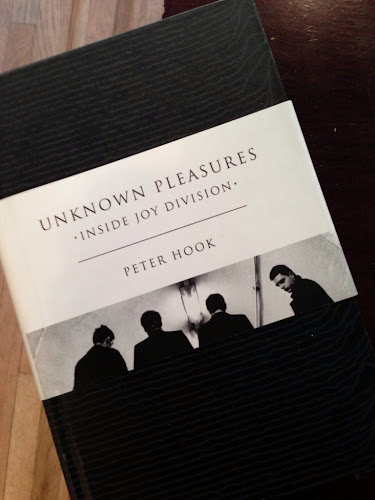Art is often the expression of the ineffable, and no art form is this more true of than music. Why does a chord sequence or a melody have the power to elicit an emotional response? Why does rhythm make our bodies move? Why do the lyrics of often very young people continue to illuminate our lives? You can analyze and deconstruct to your heart's content, but sometimes it's best to let mysteries remain mysteries. Of course, that doesn't stop us writers from finding something to say about anything that catches our attention.
And these days, it doesn't stop musicians from writing books about themselves and their music, exposing the inner workings of that which we fans hold so precious. I have avoided some of these books, either because they seem self-serving or because as I just don't want to know too much.
When I heard about Unknown Pleasures: Inside Joy Division by their bass player Peter Hook, I was going to put it in the category of books to avoid. I still find something fragile in their short career, and in Ian Curtis's short life, for one thing, and for another, Hook sometimes seems to be a right bastard in interviews. On further reflection, it was precisely for the latter reason (and an interview with Hook on WNYC's Soundcheck) that I decided to read it. I figured Hook's ability to be unvarnished and even unflattering about himself meant he could be trusted.
Also, Joy Division's music is so intertwined in my very soul that nothing could change my fundamental relationship with it. I can still remember buying my beautiful ruby red vinyl copy of Closer, which was easier to find than the first album, and being instantly captivated. We all were, and even though Ian Curtis's suicide stopped their career in its tracks, it didn't freeze the music in amber: in the world it continued to grow in stature, and in my own life it has grown with me to become one standard by which all music is judged.
Whether it was wisdom or emotion that led Peter Hook to wait more than 30 years before writing this book, there is no doubt that the distance of time is to its benefit. His point of view is disarmingly clear and his recollections ring true throughout. His love and admiration for Joy Division's musical achievement is never in doubt and there is a sense that even though he was a participant he is not entirely sure how he and his rambunctious friends created it. He can describe it, but he can't unravel it.
While Unknown Pleasures is not overtly literary, it is well organized and does not fall prey to the breathless "and then this, and then that" structure of many "as told to" books. Hook also knows how to build drama and excitement as the scrappy group originally known as Warsaw works their way up the music scene in Manchester, to London and beyond. It was a fecund time and place and he does a great job conveying the sense of possibilities and how he and his compatriots in Joy Division, and at Factory, their label, made it all up as they went along.
Hook never puts Curtis on a pedestal, but he does recognize his extraordinary talent, which went beyond just singing and writing lyrics. In one telling passage, he describes the essential role Curtis played in the songwriting process: "...he had that ear - he thought like a musician. The way it worked was that he'd listen to us jamming, and then direct the song until it was...a song. He stood there like a conductor and picked out the best bits." He is also unhesitating in his praise and respect for the other band members, guitarist and keyboard player Bernard Sumner and drummer Stephen Morris. He never loses sight of their originality and growing musical prowess. Admirably, even though his relations with them are currently at a low ebb, he never indulges in gratuitous character assassination. The fact that Sumner comes off as essentially a cold and self-involved person seems based in fact rather than hurt feelings. Hook, who lists Closer as one of his top five albums, doesn't let personalities stand in the way of the pleasure of the music itself and nor should we.
The structure of the book is well-balanced between the nuts and bolts of the music itself, the work that went into making it and the often-entertaining antics of the players involved. The fact that these were basically kids acting the way most young rock musicians act also takes nothing away from the indomitable quality of Joy Division's music. The timelines and track by track analyses break up the narrative nicely, with the latter especially being worth the price of admission. His recognition of the greatness of Joy Division's music is not bound up in his ego; he recognizes that they were a fast developing but very young band. I am in full agreement with him that Closer is the stronger of their two albums (although not by much) and that there were still opportunities for growth.
As someone who is not a fan of New Order, I will always feel that those opportunities were wasted. I'm probably not alone in that - Hook himself might agree, but we'll have to wait for his book on his second career to find out. Based on the musical erudition, emotional connection and engaging personality on display in Unknown Pleasures: Inside Joy Division, I just might pick up Hook's next volume.
Saturday, March 30, 2013
Subscribe to:
Post Comments (Atom)

No comments:
Post a Comment